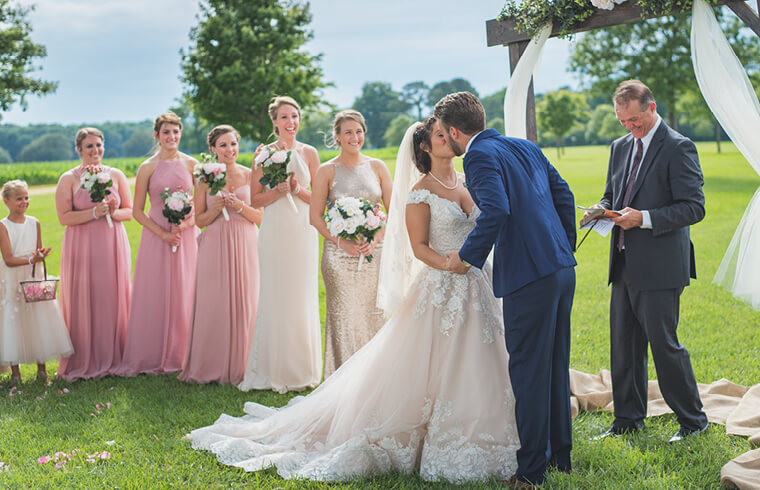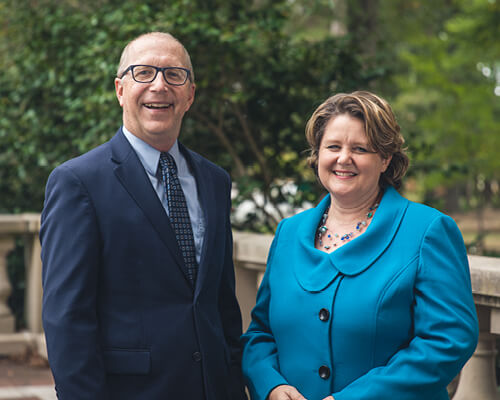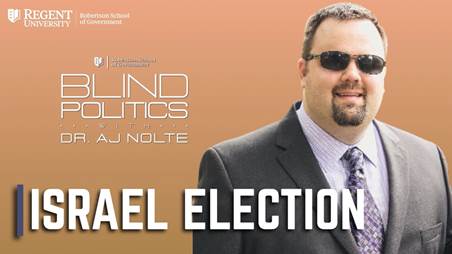Love & Marriage: Do They Still Go Together?
The ring. The dress. The ceremony. The honeymoon. These highlights of marriage are deeply ingrained in American life. Even as marriage rates have declined and the age when couples marry has increased, the notion of happily-ever-after remains for many. However, others, particularly those wary of marriage (knowing that as many as half fail), think of it as an obsolete tradition eclipsed by the common acceptance of cohabitation. Counselors, psychologists and social scientists rooted in science and faith, together, offer a more holistic view.
Dr. William Hathaway, dean of the School of Psychology & Counseling at Regent University, is one such expert. He will tell you, quite simply, that marriage is not a dying institution. In his field, Hathaway regularly encounters the view that marriage is obsolete. Yet, he explains, “It is historically the case that marriages are occurring less often in the Western world, but not in the world in general. Even in the Western world, I don’t think we see marriage going away. It’s just that we are seeing different patterns occurring, particularly in Europe, the United States and Canada.” Hathaway adds that marriage, in fact, fosters abundant social gains and benefits.
He suggests several reasons why the marriage rate has declined and points to the phenomenon of people in their 20s who are untethered to family, or the church, in an unprecedented way that calls for the church to reach out to them with a new script for life.
People are, on average, getting married 10 years later than they did in the 1950s. So now the age of first marriage is the early 30s for both men and women. Hathaway notes, “To my knowledge there’s never been another period like this in history where we have a majority of people single throughout their 20s.”
“…the biblical definition of marriage is part of the original, intended design for humans.”

What is significant about this change? “You don’t have family duties, but you’re not a teenager either. So, people can get themselves into all kinds of trouble or mischief,” Hathaway explains. “They can be lonely. They can be isolated. It’s a difficult transition our culture has made.”
To address this new norm for twentysomethings, Hathaway points both to the church and to culture for solutions. He believes both need to create productive ways for people living in this new, nontraditional, not-quite-extended adolescence, to figure out how to have productive, meaningful lives during those years. Along those lines, he suggests that the church also needs to tackle the issue of cohabitation, which is increasing even among people who identify as Christians.
“We see more people choosing to do that, not that it is advisable from a biblical standpoint, but it’s just the social reality that people are doing it,” Hathaway explains. The missing link could be hard but eye-opening conversations regarding the value and biblical call to steward our sexuality and pursue faithfulness with the lives God has given us. Hathaway, and many other Christian experts, describe marriage as a gift from God providing both a blueprint for family structure and a roadmap for navigating life’s curves.
“Marriage is an institution — a covenant that was instituted by God,” he explains. “And as a Christian institution, it involves a set of commitments.” He adds that the biblical definition of marriage is part of the original, intended design of humans. “When we couple in marital relationships, this was intended to be in contexts where we give back to the world through family, influence and service. That coupling is a marriage of one man and one woman in the biblical order. Some will be called to a remain unmarried for a substantial or entire period of their life on earth. For those called to this path, the biblical picture is one of celibacy and Christian service but not isolation or loneliness.”
Marriage as a God Idea
James Sells, professor in the School of Psychology & Counseling at Regent, supports the notion that the institution of marriage is divinely inspired. “Marriage is a God idea, like the Trinity is a God idea,” Sells explains. “As the Trinity is both individual and community in one, this idea that comes out of Genesis of two in one flesh, is similar to the concept of God being three in one.“
There is something unique and special about the joining of husband and wife and generating children and staying together for a lifetime,” he continues. “A lifelong commitment and bond are very similar to how God has defined the church.” Within this truth, Sells is careful to note that families that don’t look like the typical marriage still have great value with God at the head.
Numerous medical and psychological studies also reveal significant benefits of healthy marriages — better mental, physical and financial health, in addition to happier children. So, why are marriages so often in tumult?

When Marriages are in Tumult
Both Sells and Regent professor and psychologist Jennifer Ripley have devoted their professional lives to answer that question. As endowed co-chairs of the Rosemarie S. Hughes Christian Thought in Mental Health Practice, they conduct research, create tools and train others to help people whose marriages and families fall from the ideal.
Of the many reasons Sells points to for what he calls “brokenness in marriage,” he highlights the fact that many people simply don’t enter the union with thoughtful intention. He refers to this as “sliding in marriage, instead of deciding,” a concept created by Scott Stanley, a research professor and co-director of the Center for Marital and Family Studies at the University of Denver.
Sells explains that engagement is the time for couples to decide if they truly want to have a permanent relationship with their partner, someone with whom they want to raise children and live as a family “till death do us part.” Those who do that, he says, tend to have successful marriages: “People who slide into marriage, who think, ‘I guess we’ll get married because everyone says we should’ — but don’t stop to evaluate the relationship and whether they are compatible at a basic level — those people tend to do poorly in life.”
Similarly, Ripley notes that unmet attachment needs — those needs from childhood or previous relationships — can leave people feeling insecure and anxious about forming a life-long bond.
The concepts of grace and forgiveness contain healing power, and yet, little research has been done on their role in mending marriages. Regent’s Charis Institute hopes to change that.
“People who start out with unrealistic expectations, and for a variety of reasons such as unmet childhood needs or poor relationships with their parents, are trying to get those attachment needs with their spouse,” she says. Often, they push each other away and are incapable of creating a warm bond and attachment. But marital success isn’t black and white. Even those who enter marriage with thoughtful intention experience difficulties. What gets in the way of happy marriages? Well, in short, life’s messy details get in the way.
“We all know this, but it’s another thing to experience it. People who go into marriage wide-eyed, cognizant of the cerebral understanding of what it’s going to be like living with this person, still have problems,” Sells says.
He tells the story of a professional woman in her 30s, in the field of counseling, who faced difficulty after childbirth. “She said to me, ‘I had no idea it would be this unfair. My husband is going to work, and I’m at home nursing in the middle of the night. This is so unfair.’ But she knew it was going to be like that,” Sells recalls of their conversation.
“She’s known that for all of her adult life, but now that she’s experiencing it, it’s prompting all of the emotionality that comes with that exhaustion level.” It’s a sharp wake-up call, an all-caps message of sorts, that life has changed.
Overcoming Conflict
Research shows that most people experience conflict cycles that are imbedded and predictable for years before they seek counseling. Knowing the right time to seek counseling takes some reflection.
As Ripley explains, “When someone realizes that they keep having the same type of argument over time without resolution, that is a really good time to get somebody else in the room, an expert who can help out.” This is usually the point at which the individual or couple just want things to work out. “They don’t have a horse in the race. They don’t care which side wins. They just want help,” she says. “And that’s one of the things a therapist can offer — to help people map out their conflict and find ways to solve it.”
The first place to start, both Sells and Ripley suggest, is with a trusted pastor who can help or who can refer someone else. They stress that, when seeking outside help, people should not be afraid to ask questions about the experience of the counselor, their theory and their view on divorce. Sells emphasizes that, whether Christian or secular, marriage counselors need to fit the family.
“Marriage and Family is a subspecialty within the licensed group,” Ripley notes. “So, whether you are going to church-based counselors or a secular, licensed professional, you need to find somebody who understands and respects your values for family and who also has the experience and competency with working with families.”

Grace & Mercy: The Role of Regent’s New Charis Institute
Regent’s Charis Institute, launched by Sells and Ripley in Fall 2019, is bringing professional, biblically centered principles and practices in marriage and family care to every willing home, helper and house of worship.
The Greek word “charis” conveys the grace, mercy and lovingkindness by which God strengthens us and turns lives around. The heart of the institute is to strengthen lives and support marriages and families as cornerstones of every society.
The concepts of grace and forgiveness, as well as hope, contain healing power, and yet, little research has been done on their role in mending marriages. The Charis Institute hopes to change that.
The institute was inspired by a somewhat unlikely project. A Chinese government official with contacts at the Christian Broadcasting Network office in Beijing approached an acquaintance there to request assistance with the country’s rising divorce rate. CBN contacted Regent to request marriage and family expertise, funding was garnered through the John Templeton Foundation, and off Ripley and Sells went to Beijing.
As co-investigators, their mission was to assist churches in the development of marriage ministries and training. The concepts of grace, forgiveness and hope anchored their work, and the results have been promising.
Over 200 church leaders gained knowledge and skills in helping marriages in their church community through a brief training in Grace and Hope curriculum offered by Chinese counselors. Those church leaders have used their training to help the couples in hundreds of churches primarily through friendship counseling.

In 2019, Sells and Ripely published their results, “Promoting Healthy Marriages in Chinese Church Communities: Survey of Chinese Couples’ Marriages, Virtue-Based Training for Leaders, and Outcomes,” in The Family Journal: Counseling for Couples and Families. From this profound work, The Charis Institute was born. The team is working to expand its success regionally and nationally.
“What we do as psychology and counseling professors is to bring the professional literature of mental health, marriage and family to the Church and bring the Church to the culture of the psychology and counseling profession,” Sells explains. They do that by designing curriculum and creating interventions for the Church. Still in its infancy, the institute is poised for great impact. The team is excited about the possibilities.
We started by creating initiatives and designing studies. We’re building from the ground up,” Sells says. In this phase, the team is conducting evaluations and assessments to discover what aspects of the curriculum work and don’t work to improve marriage ministries around the world.
While the passion is usually present in marriage and family ministries within churches, that doesn’t always create a good product.
“There are a lot of homemade marriage ministries around the country, created out of people’s own inspiration. They may be great, but they may not all be great,” Ripley says. “So, we really want to help the Church be able to evaluate and improve the effectiveness of marriage ministry around the world.”
She and Sells take a multidenominational approach to their work, collaborating with a variety of churches, and including both Catholic and Protestant faiths.
“We’re looking to be a big tent in that regard because Regent is a big tent,” Sells says. “We follow the pattern that Regent started by being faithful to Christianity and the scriptures, while being inclusive of the various strains of the faith.”
“Regent continues to resource leaders in this area and to serve as a much-needed voice in the sphere of marriage and family.”
As the institute is funded by a university endowment, its growth plans include support of scholars, residents and fellows who will work in partnership with other institutions, religious denominations and nonprofits devoted to improving family life.
The developing curriculum places an emphasis on small groups led by trained professionals, the clergy or lay people.
“We believe the small group is the most effective way to have actual improvement. We want churches to have a community for couples with a similarity to each other, who are encouraging each other to grow in the faith and to weather difficult times,” Sells explains. “We’re trying to give them the curriculum to do that. We build a lot of it around Christian virtues. That’s our hallmark: grace, forgiveness, humility, compassion and gratitude.”

Moving Marriage & Family Initiatives Forward
Hathaway is enthused by the work underway through The Charis Institute. “Jim and Jen are two really strong researchers who are known in the Christian world for their expertise in this area. The fact that they partner across two of the largest mental health professions that train Christian counselors and psychologists gives us an opportunity to really create a premier place to conduct cutting-edge work,” he says. “Regent continues to resource leaders in this area and to serve as a much-needed voice in the sphere of marriage and family.”
The end goal? To strengthen individuals, couples and families for God’s glory … through hope, healing, and the redemptive power of Jesus Christ and His heart to see lives flourish.
The views and opinions expressed in this post are those of the authors and do not necessarily reflect the official policy or position of Regent University.







